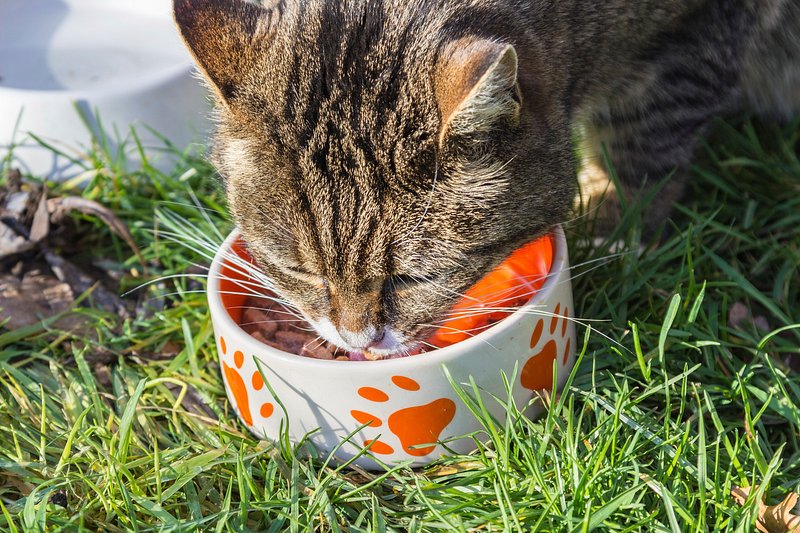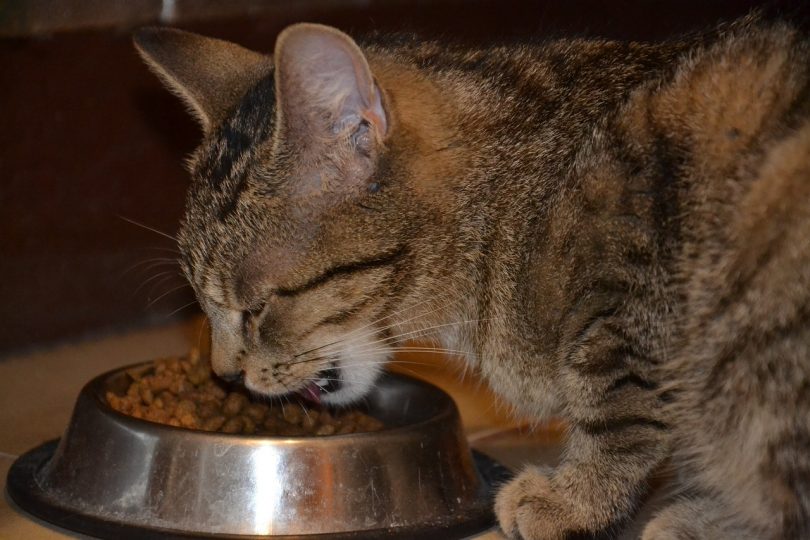When it comes to treating our furry companions, we all want to ensure we're doing what's best for them. Eggs might seem like a healthy option for us, but can they be a good treat for our feline friends? I’ve done a lot of digging into this topic, and today, I’m excited to share my findings on whether cats can safely enjoy eggs. Let’s dive into everything you need to know about egg safety for your beloved cat!
(Part 1) Understanding Your Cat’s Diet

Before we explore whether eggs are a suitable treat for your cat, it’s essential to understand a cat’s dietary needs. Cats are obligate carnivores, meaning their diet should consist mainly of meat. Unlike us, they have a digestive system specially adapted to process animal proteins and fats efficiently. While it’s fun to add variety to their diet, it’s crucial to stick to foods that align with their natural nutritional requirements.
A balanced diet for a cat includes proteins, fats, vitamins, and minerals that are predominantly derived from animal sources. Unlike dogs, who can thrive on a more varied diet, cats have a very specific set of dietary needs. This is why commercial cat foods are formulated to ensure they get the right balance of nutrients, and why introducing new foods requires careful consideration.
(Part 2) Nutritional Benefits of Eggs

Eggs are a nutritional powerhouse for humans, packed with protein, vitamins, and minerals. But how do these benefits translate to our feline friends? Here’s a breakdown of the nutrients in eggs and what they can potentially offer your cat:
- Protein: Eggs are rich in high-quality protein, which is essential for muscle maintenance and repair. For cats, this can be beneficial, especially in maintaining their lean muscle mass.
- Vitamins: Eggs contain several vitamins, including Vitamin A, which supports good vision; Vitamin D, which is important for bone health; and Vitamin B12, which aids in red blood cell formation and energy metabolism.
- Minerals: Important minerals such as iron and selenium are present in eggs. Iron helps in oxygen transport within the body, while selenium acts as an antioxidant.
These nutrients can contribute positively to a cat’s health. However, it’s important to remember that the proportions and the way cats process these nutrients differ from humans.
(Part 3) Risks of Feeding Eggs to Cats
While eggs offer several benefits, they also come with some risks. Here’s a closer look at the potential downsides:
- Salmonella Risk: Raw eggs can harbour harmful bacteria like Salmonella, which can cause serious gastrointestinal issues in both cats and humans. Symptoms might include vomiting, diarrhoea, and lethargy.
- Biotin Deficiency: Raw egg whites contain avidin, a protein that binds to biotin (a B-vitamin) and prevents its absorption. This can lead to biotin deficiency if eggs are fed frequently in their raw state.
- Allergic Reactions: Some cats may develop allergies to eggs, which can manifest as itching, rashes, or digestive problems.
These risks are significant but manageable with proper preparation. It’s crucial to be aware of these potential issues to keep your cat safe and healthy.
(Part 4) How to Prepare Eggs for Your Cat
If you decide to give your cat eggs, proper preparation is key to ensuring their safety. Here’s how to do it right:
- Cook Thoroughly: Always cook eggs thoroughly to eliminate any harmful bacteria. Options include scrambling, boiling, or poaching. Avoid adding any seasoning, butter, or oil, as these can be harmful or simply unnecessary for your cat.
- Portion Control: Eggs should be given in moderation. A small portion, such as a teaspoon of cooked egg, is usually sufficient. Too much egg can disrupt your cat’s balanced diet.
- Watch for Reactions: Introduce eggs slowly into your cat’s diet. Monitor them closely for any signs of adverse reactions such as vomiting, diarrhoea, or changes in behaviour.
Properly preparing eggs helps mitigate the risks associated with feeding them to your cat and allows you to offer them as a safe treat.
(Part 5) Alternative Protein Sources for Cats
If eggs aren’t the right choice for your cat, there are plenty of other nutritious options available. Here are some alternatives that can be great sources of protein and other essential nutrients:
- Chicken: Cooked, boneless chicken is an excellent source of protein and is usually well-tolerated by cats. Ensure that it’s free of any seasoning or sauce.
- Fish: Cooked fish like salmon or tuna can be a delightful treat for cats. However, be cautious with fish high in mercury and avoid feeding it in excess.
- Commercial Cat Foods: High-quality commercial cat foods are designed to meet all your cat’s nutritional needs. They offer a balanced mix of proteins, fats, vitamins, and minerals.
These alternatives can be just as enjoyable for your cat and may even be a more suitable option depending on their dietary preferences and needs.
(Part 6) Signs of an Unhealthy Reaction
Even with careful preparation, it’s possible for cats to have adverse reactions to new foods. Here’s what to watch for:
- Vomiting: An occasional bout of vomiting might occur, but if it becomes frequent, it’s worth investigating further.
- Diarrhoea: Changes in stool consistency can indicate digestive upset or intolerance to the new food.
- Skin Issues: Itching or skin rashes might suggest an allergic reaction to the eggs or another component in their diet.
If you observe any of these symptoms, it’s best to stop offering eggs and consult with your veterinarian to rule out any serious issues.
(Part 7) When to Consult a Vet
While many cats handle treats well, it’s always a good idea to seek professional advice, especially in the following situations:
- Pre-Existing Health Conditions: If your cat has any existing health issues, such as diabetes or kidney disease, consult with your vet before introducing new foods.
- Persistent Health Issues: If your cat experiences ongoing vomiting, diarrhoea, or other health problems, your vet can provide guidance and investigate further.
- Behavioural Changes: Any significant changes in your cat’s behaviour, such as lethargy or aggression, should be discussed with your vet to ensure it’s not related to their diet.
Your vet can help you make the best dietary choices for your cat and provide tailored advice based on their individual health needs.
(Part 8) Final Thoughts
In my experience, eggs can be a delightful and nutritious treat for cats when given in the right way. They provide several valuable nutrients that can benefit your feline friend. However, safety and moderation are paramount. Properly cooked eggs offered in small amounts can be a safe and enjoyable treat, but always monitor your cat for any adverse reactions and consult your vet if you have concerns.
Every cat is unique, so while eggs can be a great occasional treat for some, they may not be suitable for every feline. Stay attentive to your cat’s health and preferences, and you’ll be able to make the best choices for their well-being.
FAQs
1. Can I feed my cat raw eggs?
No, feeding raw eggs to cats is not advisable due to the risk of Salmonella infection and biotin deficiency from the raw egg whites. Always cook eggs thoroughly to ensure they’re safe for your cat.
2. How often can I give my cat eggs?
Eggs should be offered as an occasional treat rather than a regular part of your cat’s diet. A small amount of cooked egg, such as a teaspoon, once or twice a week is generally considered safe.
3. What should I do if my cat shows signs of an allergic reaction to eggs?
If your cat exhibits signs of an allergic reaction, such as itching, vomiting, or diarrhoea, stop feeding eggs immediately. Consult your veterinarian to determine the cause of the reaction and to discuss alternative treats.
4. Are there any other foods I should avoid giving my cat?
Yes, certain foods should be avoided due to their harmful effects on cats. These include chocolate, onions, garlic, grapes, and caffeine. Always research any new food before introducing it to your cat’s diet to ensure it’s safe.
5. Can eggs replace my cat’s regular food?
No, eggs should not replace your cat’s regular food. They should be an occasional treat and not a substitute for a well-balanced diet that meets all of your cat’s nutritional requirements.
Everyone is watching
-

Are Cat Ribs Flexible? Understanding Their Anatomy
CATS & KITTENSThis article delves into the fascinating world of feline anatomy, exploring the flexibility of cat ribs and ho...
-

Can Cats Eat Bananas? (Everything You Need to Know)
CATS & KITTENSThis article dives into the intriguing question of whether cats can safely enjoy the sweet, yellow fruit, bana...
-

Cat Lifespan: How Long Do Cats Live?
CATS & KITTENSThis comprehensive guide explores the factors influencing the lifespan of our feline companions, providing ins...
-

Can Cats Get COVID-19? What You Need to Know
CATS & KITTENSThis article will delve into the fascinating world of feline COVID-19 susceptibility. We'll explore whether ca...
-

Can Cats Eat Eggs? A Complete Guide to Egg Safety for Your Feline Friend
CATS & KITTENSWhen it comes to treating our furry companions, we all want to ensure we're doing what's best for them. Eggs...
